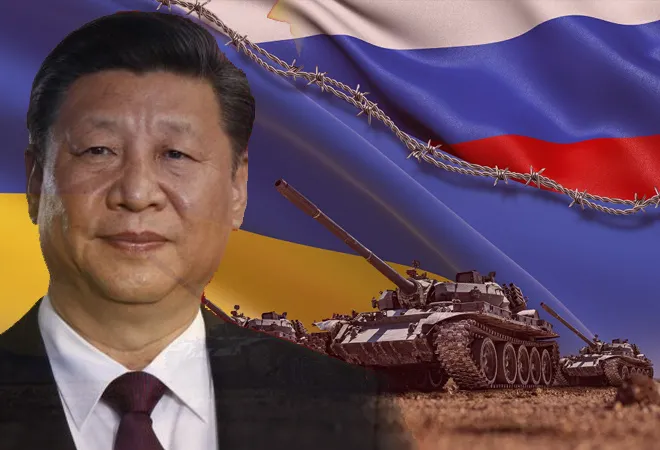
Previewing China’s strategic situation in the year 2023, what the Chinese strategic community seemed to be most concerned about is the future course of the ongoing Russia-Ukraine conflict, particularly, if it will culminate in a way that is conducive to China’s interest. Chinese
strategists acknowledge that from China's perspective, so far, the changes brought about by the conflict haven’t really been detrimental to China’s interest. The strategic
opportunities brought to China by the war are much greater than the challenges in a certain sense. Therefore, China, it seems, is not so much bothered about when the war will end, but how it will end.
Certain Chinese observers like Huang Jing, Distinguished Professor at Shanghai International Studies University, are of the opinion that a
complete victory for either side—be it Russia or Ukraine, is not in
China's interest. If Ukraine wins a big victory, it will consolidate and strengthen the
hegemony of the United States (US) and the West. They will be more confident to take on China next, to increase their resistance against China’s reunification process and even initiate a proxy war to prevent the integration of Taiwan. Meanwhile, a defeated, devastated Russia will be keener to make peace with the West and balance against its over-reliance on China. Therefore, Chinese observers argue that it is very important for China to keep Russia from falling apart on the battlefield through whatever overt or covert means, to ensure, that as an important force that challenges the US’ global dominance, Russia is not totally overpowered by the US and the West in Ukraine, otherwise China will be unlucky next.
Chinese observers acknowledge that Russia has always been sceptical of Chinese inroads into Central Asia, which it considers its traditional sphere of influence.
On the other hand, a decisive victory for Russia in the Ukrainian battlefield is also not something that China truly desires. If Russia wins a big victory, all of Ukraine and the eastern regions will become Russia's
sphere of influence, the ports in the south will come under Russian control, and Russia might seek to return to the path of economic integration with Europe, all of which are detrimental to Chinese interests. In the Chinese assessment, a Russia, engulfed in a quagmire of war, unable to extricate itself, whose access to the West has been cut off, has little option but to depend on China, therefore with little bargaining power is in China’s best interest. Afterall, the
RMB settlement of trade, the Sino-Kyrgyz-Uzbekistan Railway, the “Power of Siberia No. 2” natural gas pipeline, etc., all have been made possible by the Russia-Ukraine conflict. Chinese observers acknowledge that Russia has always been sceptical of Chinese inroads into Central Asia, which it considers its traditional sphere of influence. If Russia didn’t get battered so badly on the Ukrainian battlefield, the agreement over China-Kyrgyzstan-Ukraine Railway would never have been realised so easily. China and Russia have been wrangling over this matter for many years before the Russia-Ukraine conflict started.
However, the most unfavourable ending to the conflict, as per the Chinese
assessment, is if the Russia-Ukraine conflict come to an abrupt end, astounding the world, following a comprehensive compromise between Russia and the West, regardless of whether the compromise is initiated by the US or Russia. Russia, it is argued, might choose to surrender and compromise with the US and the West in the event of a relatively large military failure, drastic changes in the domestic political situation, or an economic collapse.
Similarly, Chinese scholars note that among the strategic elites of the Republican and Democratic parties in theUS, there is an increasingly
strong voice that theUS, as a global hegemon that has passed its “peak” period, should not be antagonising multiple powers at the same time. Former US Secretary of State Henry Kissinger has long warned that this is an unwise approach, adds Huang Jing. If this discourse gains greater currency in Washington, the Chinese side worries, the “Nixon phenomenon” might reappear once again. They argue that at the beginning, the 37
th US President Richard Nixon was among the most anti-communist and anti-China politician in the US, but he came to Beijing in 1972 and quickly reversed the global situation during the Cold War.
Once Russia compromises with the West, India will have a high chance of strengthening cooperation with Russia to deal with the security threat in the northwest of the country, and can also free up its hands to invest more time and energy in “balancing” China.
The possibility of such a compromise, the Chinese side believes, would increase significantly if the White House changes hands in the 2024 presidential election. They point out that many Republicans had originally opposed the US’ excessive participation in the Ukraine crisis. They continue to hold a negative attitude towards US military aid to Ukraine. As the conflict between Russia and Ukraine has become rather protracted, the Republican establishment has been somewhat weary of the Ukrainian issue and has been increasingly hyping up the issue of US taxpayer money being spent for military aid to Ukraine so as to attack the Democratic Party and the Biden administration.
If such a compromise materialises between the US and Russia in the coming days, Chinese strategists warn, the security environment of China could deteriorate drastically. First of all, India, they
say, will be much more unrestrained and have a freer hand in “balancing” China. As is evident, the Russia-Ukraine conflict has exposed India's biggest weakness and put it under immense pressure from the US and other European powers. Once Russia compromises with the West, India will have a high chance of strengthening cooperation with Russia to deal with the security threat in the northwest of the country, and can also free up its hands to invest more time and energy in “balancing” China.
The situation in
Japan will also be similar. After all, being enemies with China and Russia at the same time is Japan's biggest strategic nightmare. In recent months, when China-Russia conducted military exercise around the Japanese island, Japan came under enormous pressure. Once Russia compromises with the West, Japan will immediately get closer to Russia. At that time, without Russia as an opponent, Japan, under the leadership of the US, will be poised to further up its ante against China. Therefore, from that perspective, if Russia reaches a compromise with the West, Chinese strategists agree, it will have the worst impact on China's national interests.
If Russia and the West get engulfed in a lose-lose fight for several years, where both sides continue to consume each other and both are eventually weakened, that will be the most in line with China's national interests.
Therefore, most Chinese observers are of the opinion that the “Afghanisation” of the Ukraine crisis, which is a protracted Russian-Ukrainian war that lasts for decades, bleeding both the Russian as well as the western side (both the US and its European allies) is in the best interest of China. In other words, if Russia and the West get engulfed in a
lose-lose fight for several years, where both sides continue to consume each other and both are eventually weakened, that will be the most in line with China's national interests. In that case, on one hand, the pressure on China in the Indo-Pacific region will be eased to a great extent,
industrial migration from Europe (to China) will continue due to unfavourable security situation, decreasing competitiveness of industries in war-torn Europe etc., on the other hand, China will now be able to enjoy unhindered access to Central Asia and the Far-East. What’s more important, China will be the only major power emerging largely
unscathed from this war of attrition and therefore, will be in a much better position to resolve the Taiwan issue, as per its own terms and at a much lower cost.
A recent
article in the
Financial Times argues, quoting various unnamed “Chinese officials with knowledge”, that Russia’s faltering “military adventure” in Ukraine has “reduced Beijing’s return on investment in its bilateral ties with Moscow”, that Beijing is now trying to “distance itself from Putin and his policies”, do a “course correction on Russia” and seek a “diplomatic reset” with the West, particularly Europe. However, looking at China’s internal discourse on Russia-Ukraine conflict, such proposition looks, either like a propaganda blitz by Beijing or wishful thinking on part of a section of western strategic community. For China’s strategy towards the ongoing European crisis, as evident from the discussion above, is the hill and clearly to sit on watch the tigers fight or as the Chinese would often say, reap fisherman’s benefit in the fight between the snipe and the clam, despite all its lip service on peace and reconciliation.
The views expressed above belong to the author(s). ORF research and analyses now available on Telegram! Click here to access our curated content — blogs, longforms and interviews.



 Previewing China’s strategic situation in the year 2023, what the Chinese strategic community seemed to be most concerned about is the future course of the ongoing Russia-Ukraine conflict, particularly, if it will culminate in a way that is conducive to China’s interest. Chinese
Previewing China’s strategic situation in the year 2023, what the Chinese strategic community seemed to be most concerned about is the future course of the ongoing Russia-Ukraine conflict, particularly, if it will culminate in a way that is conducive to China’s interest. Chinese  PREV
PREV


